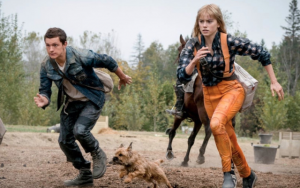BOOZE AND REVIEWS: THE PERFECT COCKTAIL TO ENJOY WITH “CHAOS WALKING”!
 Richard finds the perfect cocktail to enjoy while having a drink and a think about the dystopian young adult drama “Chaos Walking.”
Richard finds the perfect cocktail to enjoy while having a drink and a think about the dystopian young adult drama “Chaos Walking.”
Watch the whole thing HERE!
 Richard finds the perfect cocktail to enjoy while having a drink and a think about the dystopian young adult drama “Chaos Walking.”
Richard finds the perfect cocktail to enjoy while having a drink and a think about the dystopian young adult drama “Chaos Walking.”
Watch the whole thing HERE!
 On paper “Chaos Walking,” a new dystopian movie starring Daisy Ridley and Tom Holland and now on PVOD, seems like a can’t fail for sci fi fans. In execution, however, the story of a world where men’s thoughts are manifested for all to see, is a letdown.
On paper “Chaos Walking,” a new dystopian movie starring Daisy Ridley and Tom Holland and now on PVOD, seems like a can’t fail for sci fi fans. In execution, however, the story of a world where men’s thoughts are manifested for all to see, is a letdown.
Based on “The Knife of Never Letting Go,” the first book of the Patrick Ness “Chaos Walking” trilogy, the story takes place in the year 2557 in a place called Prentisstown on the planet New World. Colonized by refugees from Earth, New World’s original inhabitants, the Spackle, fought back, slaughtering many of the male settlers and all the women. The surviving men contracted something called “The Noise.”
“It happened when we landed on the planet,” says Mayor Prentiss (Mads Mikkelsen). “Every thought in our heads is on display.”
Prentisstown residents, like Todd Hewitt (Holland), walk around with their thoughts exposed like wisps of multicolored cigarette smoke swirling around their heads.
When her spaceship crash lands on New World it leaves earth woman Viola (Ridley) stranded in this strange world. Todd, who has never seen a woman before, helps her navigate the dangers of her new home, as they both discover the deeply held secrets of New World.
“Chaos Walking” has ideas that feel ripe for satire, social commentary and drama but squanders them in favor of crafting a tepid young adult friendly dystopian story. Todd’s “Noise” reveals the kind of thoughts a teenager may have when first laying eyes on a girl, although in a g-rated fashion. His inner voice mumbles “Pretty” in Viola’s presence, but that’s about as deep into his psyche we get. It’s a shame because the “Noise” device could have been used to provide some much-needed humour into this earnest story. Or to more effectively drive the plot or the tension between the two characters. Instead, it is inert, a ploy to add some interest to a generic dystopian tale.
“Chaos Walking” was shot in 2017, deemed unreleasable, and has been fiddled with ever since. It hits PVOD as a film of unrealized potential, a minor footnote on the IMDB pages of its stars.
 Richard speaks to “CTV News at 11:30” anchor Andria Bain about movies on VOD and in theatres to watch this weekend including “Wonder Woman 1984” (available in theatres and as a 48-hour rental on various digital movie stores for $29.99), the timely sci fi of George Clooney’s “The Midnight Sky” (Netflix) and Tom Hanks, western style in “News of the World.”
Richard speaks to “CTV News at 11:30” anchor Andria Bain about movies on VOD and in theatres to watch this weekend including “Wonder Woman 1984” (available in theatres and as a 48-hour rental on various digital movie stores for $29.99), the timely sci fi of George Clooney’s “The Midnight Sky” (Netflix) and Tom Hanks, western style in “News of the World.”
Watch the whole ting HERE! (Starts at 25:18)
 Richard joins CP24 to have a look at new movies coming to VOD, streaming services and theatres including the return Diana Prince in “Wonder Woman 1984” (available in theatres and as a 48-hour rental on various digital movie stores for $29.99), the existential animation of “Soul” (Disney+), the timely sci fi of George Clooney’s “The Midnight Sky” (Netflix) and Tom Hanks, western style in “News of the World.”
Richard joins CP24 to have a look at new movies coming to VOD, streaming services and theatres including the return Diana Prince in “Wonder Woman 1984” (available in theatres and as a 48-hour rental on various digital movie stores for $29.99), the existential animation of “Soul” (Disney+), the timely sci fi of George Clooney’s “The Midnight Sky” (Netflix) and Tom Hanks, western style in “News of the World.”
Watch the whole thing HERE!
 Richard sits in on the CFRA Ottawa morning show with guest host Matt Harris to talk the new movies coming to theatres, VOD and streaming services including Gal Gadot’s return to superhero-dom in “Wonder Woman 1984” (available in theatres and as a 48-hour rental on various digital movie stores for $29.99), the existential animation of “Soul” (Disney+), the timely sci fi of George Clooney’s “The Midnight Sky” (Netflix), Tom Hanks, western style in “News of the World” and “Chicago 10” (The Impact Series, VOD/Digital).
Richard sits in on the CFRA Ottawa morning show with guest host Matt Harris to talk the new movies coming to theatres, VOD and streaming services including Gal Gadot’s return to superhero-dom in “Wonder Woman 1984” (available in theatres and as a 48-hour rental on various digital movie stores for $29.99), the existential animation of “Soul” (Disney+), the timely sci fi of George Clooney’s “The Midnight Sky” (Netflix), Tom Hanks, western style in “News of the World” and “Chicago 10” (The Impact Series, VOD/Digital).
Listen to the whole thing HERE!
 Guest morning show host Matt Holmes talks to Richard about the much anticipated superhero flick “Wonder Woman 1984” (available in theatres and as a 48-hour rental on various digital movie stores for $29.99), the existential animation of “Soul” (Disney+), the timely sci fi of George Clooney’s “The Midnight Sky” (Netflix) and Tom Hanks, western style in “News of the World.”
Guest morning show host Matt Holmes talks to Richard about the much anticipated superhero flick “Wonder Woman 1984” (available in theatres and as a 48-hour rental on various digital movie stores for $29.99), the existential animation of “Soul” (Disney+), the timely sci fi of George Clooney’s “The Midnight Sky” (Netflix) and Tom Hanks, western style in “News of the World.”
Listen to the whole thing HERE!
 Although “The Midnight Sky,” a new apocalyptic thriller from George Clooney and now streaming on Netflix, was written and filmed before the pandemic, timely themes of isolation and the importance of human connection resonate loudly throughout.
Although “The Midnight Sky,” a new apocalyptic thriller from George Clooney and now streaming on Netflix, was written and filmed before the pandemic, timely themes of isolation and the importance of human connection resonate loudly throughout.
Set in the near future, Clooney, who directed, produced and resembles q post “Late Show” David Letterman here, stars as Augustine, an astronomer battling cancer and loneliness at the Barbeau Observatory, a remote Arctic research station. Some sort of global nuclear catastrophe has devastated life on earth, leaving him isolated and alone until Iris, a wide-eyed, silent girl (Caoilinn Springall) mysteriously turns up at the station.
While tending to his new charge, Augustine is duty bound to contact and warn the Aether, a NASA space station returning home after a two-year mission exploring a newly discovered moon of Jupiter.
Led by husband-and-wife Adewole and Sully (David Oyelowo and Felicity Jones), the crew (Kyle Chandler, Demian Bichir, Tiffany Boone), hurtle toward the barren planet, unaware that life as they knew it on earth has ceased.
“Are you receiving this?” Augustine, says, fruitlessly trying to communicate with the Aether. “Is anyone out there?” To reach them Augustine and Iris take on a dangerous mission, a trek through kilometres of deadly ice, snow and 80-kilometre-per-hour winds. “There is antenna that’s stronger than ours,” he says. “If we can get to that antenna, they’ll hear us.”
“The Midnight Sky” is a multi-hyphenate, a dystopian-sci-fi-outer-space-thriller. While that’s accurate, that’s also six too many words to correctly describe what Clooney has created. All those elements exist in the film but the unwieldy list leaves out the film’s humanity. Sure, there’s some wild blue yonder action with people floating through space capsules and a barren planet, but this is a story of regret and redemption, handled with subtlety and grace.
The story has two distinct halves. Clooney says “half of it is “Gravity” and the other half of it is “The Revenant,” and sometimes they feel too distinct; disconnected. Augustine’s journey to redemption as he nears death is heavy-hearted and austere. The crew’s situation is different. Although they are cut loose in space, they represent the future of humankind, in whatever form that may take. The two halves sit side-by-side but don’t always fit together like puzzle pieces.
The thing that binds the story threads is a search for salvation. Augustine and Iris and Sully, who is expecting a child, are among the last of human life, and face an uncertain future. Each is doing what they can to determine whether mankind has a chance or not. And while the film offers hope and a chance of recovery, both personally for the characters and for the world as a whole, it does so without pandering to easy plot points.
Based on the 2016 Lily Brooks-Dalton novel “Good Morning, Midnight” with a screenplay by Mark L. Smith (screenwriter of “The Revenant”), “The Midnight Sky” is deliberately paced, humanistic sci fi that values ideas over action. It has epic scenes—particularly the snow storm trek—but feels more like an intimate drama than high action film. Clooney uses silence to speak loudly about the film’s most timely and important theme, the need for connection. It’s the lesson of the film and, these days, in real life.
 Richard speaks to “CTV News at 11:30” anchor Andria Case about movies on VOD and in theatres to watch this weekend including the childhood fantasy “Come Away,” the romance of “Ammonite” and “Freaky,” a body switch slasher flick starring Vince Vaughn.
Richard speaks to “CTV News at 11:30” anchor Andria Case about movies on VOD and in theatres to watch this weekend including the childhood fantasy “Come Away,” the romance of “Ammonite” and “Freaky,” a body switch slasher flick starring Vince Vaughn.
Watch the whole thing HERE! (Starts at 24:08)
 Richard and CP24 anchor Courtney Heels have a look at “Ammonite” (in theaters 11/13, premium on demand 12/4), the horror comedy mash-up of “Freaky” (in theatres), the kid’s movie for adults “Come Away” (EST) and the serious slacker comedy “Saint Frances.”
Richard and CP24 anchor Courtney Heels have a look at “Ammonite” (in theaters 11/13, premium on demand 12/4), the horror comedy mash-up of “Freaky” (in theatres), the kid’s movie for adults “Come Away” (EST) and the serious slacker comedy “Saint Frances.”
Watch the whole thing HERE!